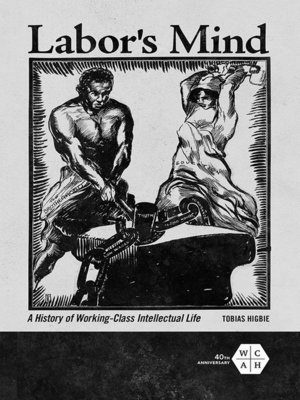Labor's Mind
ebook ∣ A History of Working-Class Intellectual Life · Working Class in American History
By Tobias Higbie

Sign up to save your library
With an OverDrive account, you can save your favorite libraries for at-a-glance information about availability. Find out more about OverDrive accounts.
Find this title in Libby, the library reading app by OverDrive.



Search for a digital library with this title
Title found at these libraries:
| Library Name | Distance |
|---|---|
| Loading... |
Business leaders, conservative ideologues, and even some radicals of the early twentieth century dismissed working people's intellect as stunted, twisted, or altogether missing. They compared workers toiling in America's sprawling factories to animals, children, and robots. Working people regularly defied these expectations, cultivating the knowledge of experience and embracing a vibrant subculture of self-education and reading. Labor's Mind uses diaries and personal correspondence, labor college records, and a range of print and visual media to recover this social history of the working-class mind. As Higbie shows, networks of working-class learners and their middle-class allies formed nothing less than a shadow labor movement. Dispersed across the industrial landscape, this movement helped bridge conflicts within radical and progressive politics even as it trained workers for the transformative new unionism of the 1930s. Revelatory and sympathetic, Labor's Mind reclaims a forgotten chapter in working-class intellectual life while mapping present-day possibilities for labor, higher education, and digitally enabled self-study.|
Cover
Title
Copyright
Contents
Acknowledgments
Introduction
Part I: Reading the Marks of Capital
1. "A little avenue to self-mastery": The Social World of Working-Class Readers
2. "All sorts of wild, impassioned talk": Open Forums and the Working-Class Public Sphere
3. "To see and hear things that have always been there": Labor's Pedagogy of the Organized
Part II: Imagining Critical Consciousness
4. Brain Workers in the House of Labor: Life Stories and the Politics of Experience
5. Icons of Ignorance and Enlightenment: The Visual Culture of Critical Consciousness
Conclusion: Self-Education in the Shadow of the Cold War
Notes
Bibliography
Index
|"Tobias Higbie's Labor's Mind: A History of Working-Class Intellectual Life is a slim volume with an expansive reach. . . . It suggests that education, formal or informal, can spark radical social change. . . . Higbie's book is profoundly optimistic, if subtly so." —American Historical Review
"Labor's Mind places working people's ideas and intellect—not just their quotidian lives and labor—at the center of historical study. Higbie has given us a rich portrait of working men and women thinking as the United States emerged as a global industrial power, a portrait they richly deserve." —North Carolina Historical Review
"A major contribution to the history of American working people's thought and movement-building in the modern era. Brophy would be pleased." —Journal of American History
|Tobias Higbie is a professor of history at UCLA. He is the author of Indispensable Outcasts: Hobo Workers and Community in the American Midwest, 1880-1930.
"Labor's Mind places working people's ideas and intellect—not just their quotidian lives and labor—at the center of historical study. Higbie has given us a rich portrait of working men and women thinking as the United States emerged as a global industrial power, a portrait they richly deserve." —North Carolina Historical Review
"A major contribution to the history of American working people's thought and movement-building in the modern era. Brophy would be pleased." —Journal of American History
|Tobias Higbie is a professor of history at UCLA. He is the author of Indispensable Outcasts: Hobo Workers and Community in the American Midwest, 1880-1930.







